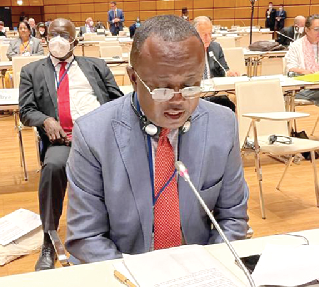
Using COVID-19 emergency to abuse power unfortunate — Osei-Owusu
The First Deputy Speaker of Parliament, Mr Joseph Osei-Owusu, has said the quest to contain the COVID-19 pandemic has led to the use of emergency powers by some governments, giving rise to widespread abuse of those powers.
He said the excessive use of emergency powers by the Executive arm of government was being carried out without recourse to the legislature in those countries.
Advertisement
Contributing to a panel discussion at the fifth World Conference of Speakers of Parliament in Vienna, Austria, Mr Osei-Owusu added that in some cases, such powers were exercised without due consideration to the concerns of opposition parties.
“In others, they have been very repressive in their outlook and devoid of public input and the preferences of the governed. Human right abuses are inherent in these, as basic freedoms are denied the people,” he said.
The panel discussion was on the topic: “Emergency measures imposed by government must always be subjected to parliamentary approval and regular review”.
Mr Osei-Owusu, who led Ghana’s delegation to the conference, further observed that there had been the use of draconian measures to impose far-reaching restrictions in certain parts of the world.
“Emergency powers of some governments around the world have been expanded beyond the reasonable remit of the law and media freedoms have been suppressed, preventing the publication of any material other than what is politically correct from the perspective of governments,” he said.
Threat
According to the first deputy speaker, the threat to democracy occasioned by the pandemic appeared to be more catastrophic than the losses being experienced in some countries, adding that the world risked losing the dividends of democracy should governments fail to act in unison and quickly.
“It is a truism to state that the pandemic has come to stay, at least into the foreseeable future. Its impact has been devastating to the global economy, just as it has constrained the space for good governance around the world,” he said.
Mr Osei-Owusu maintained that “the legitimacy granted by parliamentary approval in the use of emergency powers by a government is complemented by the implicit consent of the public to cooperate with the government in finding lasting solutions to problems. In the light of the foregoing, it is my considered opinion that it is always necessary to subject the use of emergency powers by government to regular legislative scrutiny and reviews”.
While admitting that emergency powers were essential in dealing with major global challenges, such as the pandemic, he said it was for a good reason that the laws in most countries required that emergency measures taken by governments were brought to the legislature for ratification, particularly in extending the minimal terms that the laws often granted governments to exercise.
Ghana’s experience
Mr Osei-Owusu cited Ghana’s situation, where the legal regime granted the President limited authority to deal with the pandemic — three months in the first instance, with an extended period of another three months when it becomes necessary.
That way, he said, Parliament retained its supervisory role over the Executive.




